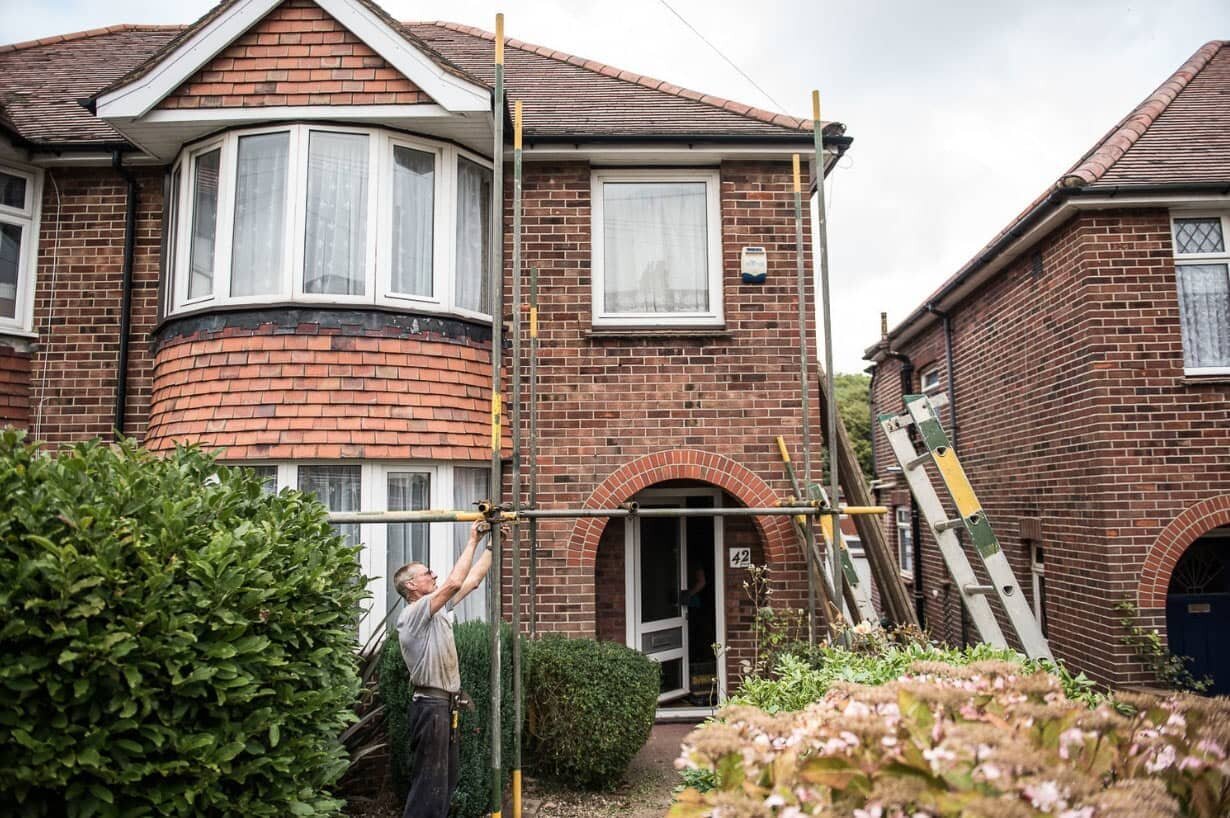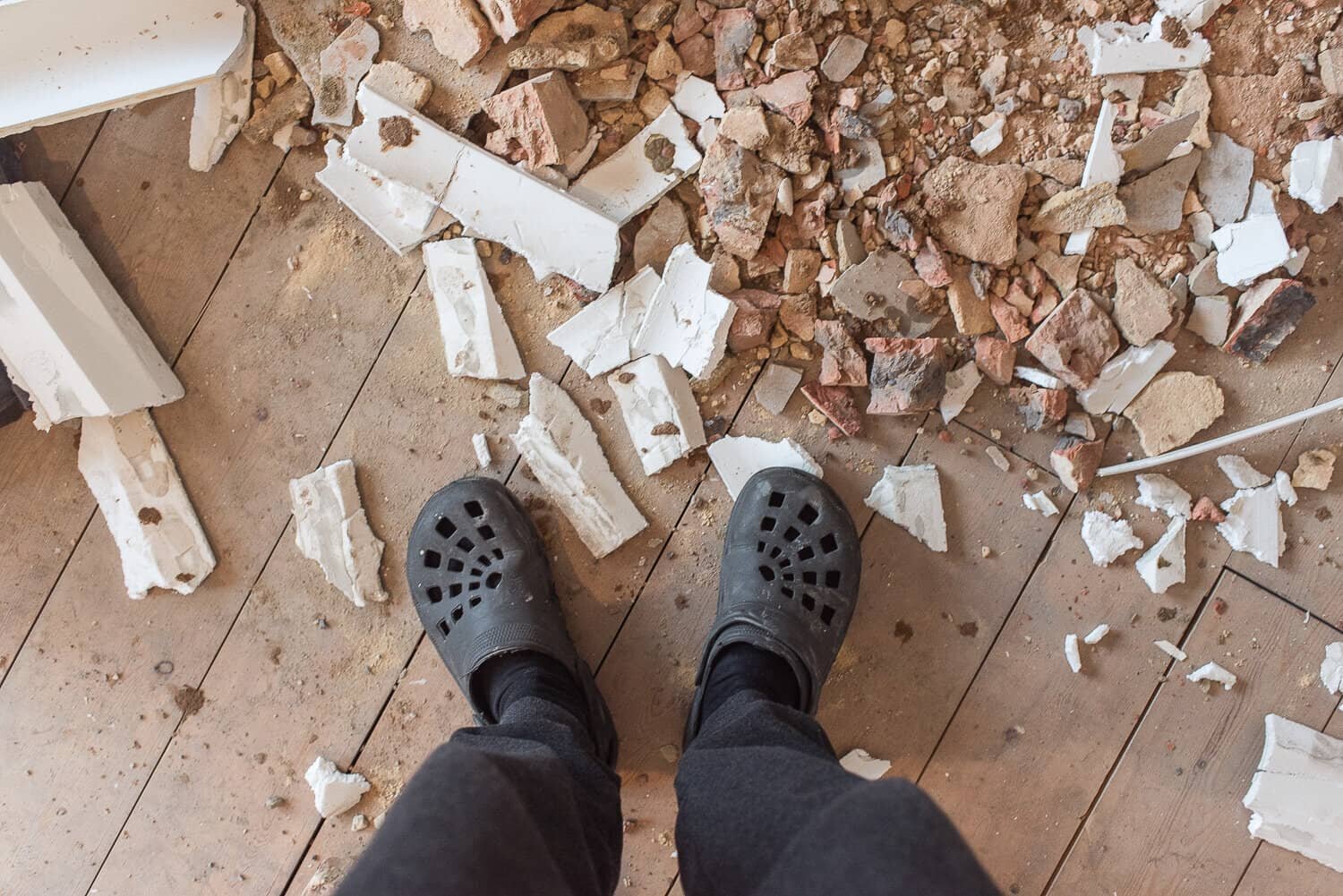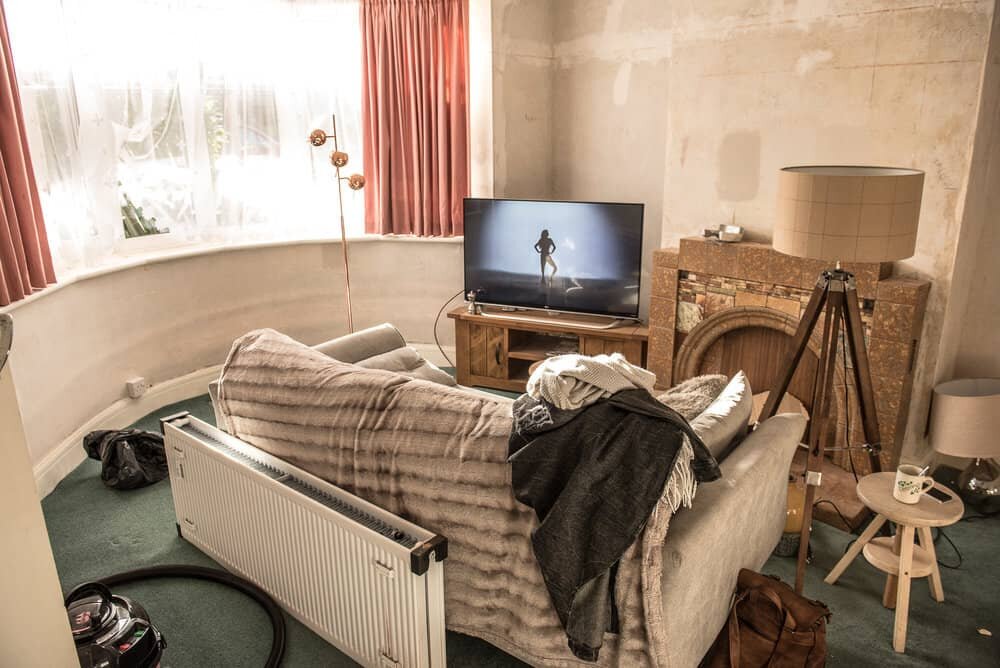What To Look For When Buying a House to Renovate
What to look out for if you’re buying house to renovate!
You wouldn’t believe how excited/nervous we were when we bought this ugly duckling 1930s house renovation in the UK. That photo below is from the day we moved in. Having never bought a fixer-upper before on this scale before, it's safe to say there were a lot of things Neil and I wish we knew what to look for when buying a house to renovate.
The old lady that was selling it hadn't touched it since the 1960s and so there was a lot of work to do. It didn't have a central heating system or gas, every room was dripping in spew-worthy wallpaper or carpet and the kitchen was a small galley layout. We decided that we fancied the challenge of renovating the house and it has been one of the most challenging but rewarding projects we've ever worked on.
If you’re looking at buying a house that needs renovation and to make completely your own, then there's a few points we've learned to look out for along the way.
First time renovators are woefully under-prepared, so that’s where our blog and online courses come in and so we put together this guide on what to know when buying a a house to renovate.
In our experience of viewing fixer uppers, you normally only get one 10 minute show around a house before you make your offer, so you better make it count.
The fact is, older houses can hide a lot, looking quaint or full of character on first look, and then being an absolute horror show of a few decades worth of bad DIY under a single strip of wallpaper.
So what should you expect when you decide to take on a house in need of renovation?
What major work can be hiding in the walls?
A few things to consider before you make your offer...
Do your research about the property both before and after viewing it
If you're not an expert, going to view a house that needs renovation (or any property for that matter) makes you feel like you're wandering into a gunfight holding a sword.
You're wandering around with about 10 minutes to spare whilst an estate agent tries to "inform you" about the property (you know fully well that they have very little valuable information about it). Part of the problem is that first-time buyers don’t know the right questions to ask.
We have a very useful free resource called The Property Viewing Checklist (see the spreadsheet below) that you can download that looks at exactly the sorts of things you should consider.
Note - We would 100% recommend getting the experts in at a later date to look at the property if you’re getting into the offer stage, but there are things you can do upfront to try and understand whether the property is for you or not.
A completely free viewing checklist that you can use in Google Sheets
2. Try to understand your ‘red lines’ and make a list
When looking for a property to renovate, it can become extremely stressful. Doer uppers are potentially big risks.
There are moments when you’re going to start feeling like you’d just move in anywhere in order to stop the pain in the proverbial of having to keep looking for one (we promise you the thought will go through your head). The constant balancing of pros and cons and making decision after decision gets super tiring and you start saying and thinking things you haven’t thought through properly.
Establishing your red lines upfront i.e. the lines you will not cross in terms of your property requirements, could help you years down the road. An example could be before the renovation saying “I would never live in that area because there are no good schools” and then when the stress kicks in “We can live without good schools because the property has so much potential” (bit of an extreme example but hey…)
Create a list of your requirements. If you’re looking with your significant other, make sure that you are both aligned to them. Establishing those lines upfront improves communication and makes it easier to ask yourself serious questions when the going gets tough.
3. Make sure you understand how much a renovation would cost
Clearly the biggest deciding factor about whether you can do a renovation is cost. We've written a post all about how much it costs to renovate a house so we'll leave all of that useful info there. But needless to say, performing rough calculations about how much work you'd need to do is a really important step.
You'll need to break down "finger in the air" estimates to understand a ball park figure. You'll definitely hit a brick wall (so to speak) where you just can't work out how much things will cost, but you should be able to find some local information on the internet.
4. Understand the Limitations of Permitted Development Rights
One of the most overlooked aspects when buying a house to renovate is understanding what changes you can legally make without applying for planning permission. And, understanding whether the work you want to do will get sign off at planning stages.
Not every property offers the same flexibility under permitted development or planning permission rights, and restrictions may apply in conservation areas or for listed buildings. So we tell everyone… before falling in love with a fixer upper, check with the local council or use online tools to see what’s allowed and what’s been given the green light. You can easily search neighbouring planning applications to give you an indication. This step can save you from disappointment if your dream extension or loft conversion isn’t possible. And if the property you want to renovate does require planning permission for major works, factor in both the time and potential costs this will add to your renovation.
5. Get a building survey done
We've always gone for a full structural (building survey) and yes they’re expensive, and yes it feels ‘wrong’ spending a lot of money on a fixer upper that isn’t even yours yet...
But to put this initial survey cost in perspective, whilst in renovation mode, batches of thousands of pounds start to disappear without much bother. As the survey will probably be your first cost, it is going to seem high, so your instinct may naturally be to try and keep costs down. People who say "just get a homebuyers report" are probably the people that never experienced any real structural or fundamental issues.
Getting a building survey done is a less risky step as it creates a sort of shopping list for the repair of your property. Sellers play nasty tricks like wallpapering over cracks, and as cliché as it sounds, it does happen. And whilst a property may look OK to you, the reality may be very different.
Check out our beginners guide on the the different types of house survey if you want to look at which one to go for as you’re planning your fixer upper purchase.
6. Get a friendly builder to come and view the property and provide rough calculations on what it might cost to renovate
If you have a rough idea of what you want to do to the property and a structural survey you should be on your way to getting some costings. Pre-exchange of contracts, many builders will resist providing this service and we experienced some huffing and puffing when speaking to builders about helping us on a property that we hadn't moved into yet so bear in mind you might have to pay the builder for their time if they’re not friends of yours. It's probably best to prioritise structural items (for example getting them to quote on things that absolutely must be done rather than nice-to-haves).
7. Ensure that the cost of any fixer upper reflects the work needed
Any property that needs work should be on the market for a lower price than comparable properties that have already been finished to a good standard. Once you've understood the high-level/ball park renovation costs, a good exercise is to compare similar renovated properties to the cost of the fixer upper you're looking at PLUS the renovation costs.
For example we were looking at a house for £400K that had been renovated to an estimated total of 70-80k – so really, the fixer upper we were looking at had to be priced no more than £320-£330K.
8. Work out what you can compromise on
4 out of 10 renovators go over budget. You might be in a situation like us where our idea for aspirations for a kitchen extension plan crumbled like rubble before our eyes upon receiving an eye-wateringly high quote. It was just too expensive to justify the benefits it would bring to us. Thankfully the space that we had to work with was of a sufficient size that we would be able to do several other things with it. There might be times when you need to compromise, so come up with a plan B and a plan C and D.
9. Ask yourselves can you live in the property while you renovate?
If we're honest, living in a renovation is not exactly a breeze, especially when the kitchen/bathroom is being done. You’re going to have to drop your cleanliness standards, full stop. However making food is possible if your builders tidy up after themselves each day and you plan well. You can create a makeshift kitchen quite easily as long as you have access to running (ideally hot) water.
It's a huge workaround for a few weeks whilst this crucial part gets done. The main issue we experienced was when we decided to work from home and the noise of power drilling was unbearable, there's nothing you can do to get away from this type of noise. If you can find a plan to get out of the house then do it.
Having said all that, it does have its benefits; you save on storage costs or rent and you can keep close to the renovation. Our blog post What it’s like living in a renovation gives you more help on this subject.
10. Ask who the sellers are
Get to understand who the sellers of a property are. Ask the estate agents all about them, how old they are, when they moved in and where they are going to. You might find that the sellers are in a weaker position and really they just want a quick sale on the property. We found out that our sellers were not in a strong position and we used it to our advantage in the negotiation. If the owner of the fixer upper you have your eye on is in a rush to sell, you could shave off ££s in negotiations.
11. Negotiate on what you find in the structural survey
The more problems you find in the structural survey, the more you can reduce your eventual price you offer. The secret is that many renovation properties are being sold when an old person goes into a home/elsewhere and the next of kin 'need' the money to pay for that, 10-20K would not be noticed as much as 10-20k to a couple who are up-sizing. Get into the psychology of this, if you are asking for a reduction, then it's quite likely that anyone else in your position would do the same - are the sellers willing to gamble because you asked for a reduction?
If you’re British like us, negotiating is probably not in your blood. We strongly recommend that you grow a pair and be a bit cut-throat, otherwise you’re going to get trampled over like the flimsy doormat in said renovation property!
12. If you run out of money what will you do?
As difficult as it is, you've got to think about what would happen in the event that you completely run out of money. For us, we eventually did run out of money but only after we had completed the pressing stuff (structural, gas/central heating install, the exterior, the entire downstairs, two bedrooms done) it was always part of our thinking that we would be in a situation where we would have to find money for the rest elsewhere but we've got our whole lives to do this, there's no need to rush. Thankfully our plan meant that the lowest priority items were the last things we did and we had sufficient disposable income that we would be able to save for the rest of the rooms.
13. Look for properties that are renowned to be well-built
We consider ourselves pretty fortunate that we landed a 1930s house. There are many reasons why a 1930s house rules the roost in terms of build quality. By the 1930s, house building had evolved to a point that modern technology was around such as cavity wall insulation but combined with period features such as chimney breasts/alcoves and decorative exterior features.
14. Speak to the locals
It's quite likely that there's a huge source of information just waiting for you around the corner from the property. If you're reserved British people like us, knocking on a complete stranger's door may seem pretty alien. However we've had people knock on our door to talk about our house and we've really enjoyed it, your house becomes part of your life and talking about it with people who have a mutual interest is a great ice-breaker.
They can discuss with you things that won't be obvious upon viewing a property like noisy neighbours, parking issues, issues with damp and subsidence and since many areas have the same build style of houses, there will be a plethora of information about the properties too.
15. Fixer uppers are stressful - get ready for that
You're going to be in uncharted territory, especially if you're a first time buyer. This is a complex process and aside from all the paperwork, mortgage stress, the viewings, the "will we ever find a place that we like/love?" uncertainty, you're now adding in a whole world of newness with regard to a renovation and unknowns about how much things will cost.
No matter how much you plan, there will be most definitely things that crop up that weren't expected. As soon as the builders start peeling back the layers of your house, who knows that they might find...The first step is having a clear idea idea of what you want to achieve, a view of the priorities, a solid budget with some contingency and a fall back plan - could there be a cheaper way to do what you're thinking of doing?
16. Consider the plumbing in a fixer upper
It sounds like a silly thing to reflect upon but plumbing and heating is so essential to get right in a house. Any problems with water damage and you could be looking at a hefty repair bill and a big headache before you've even moved in.
What's more, if there are problems with plumbing it can often mean floorboards (and flooring) having to be ripped up to make corrections, ruining your hard work. Plumbing is common work for a renovation, but it's important to recognise (as best as you can) any potential problems so that your offer on a house reflects the money you'll need to pay for maintenance of it when you move in.
Consider the following process:
Get a full structural survey on any property you buy and chat with the surveyor before they survey it.
Ask them how much of the plumbing they can cover in the survey
If it's minimal, request a drainage survey (usually done using a CCTV camera in man holes nearest your property) to check everything is above board before you begin any work.
When our offer was accepted we did both a full structural survey and drainage survey and reduced our offer when issues arose - this is quite normal and depending on the situation you could save thousands of pounds.
17 . Take a look at the electrics in the renovation property
Electrics will almost definitely need attention in an older property, largely because building regulations have much tighter standards every property must adhere to now, but also because period homes weren't wired with all the lights and plug sockets we need for our modern day lifestyles.
Having old circuits might not comply with the power you need when you come to make electrical changes to suit your lifestyle. Here are some tips:
When you're looking around at the property pay close attention to your fusebox for the age it looks and if you can, take a photo of it.
If you're not sure whether it's a old board or a new one that might comply with building regs, call an electrician to ask for his advice and send the photo to him. They will normally offer this advice free as it could mean business for them if you end up buying it and need a rewire.
When we moved in to our renovation property we realised we needed a whole new fuse board which cost roughly £500 (that excludes the rewire elsewhere in the house). We also failed our electrical testing report initially, which meant that if we had a fire caused by the electrics, our home insurance wouldn't have paid out. If you know of any electricians that don't mind swinging by on the viewing this can help you negotiate your offer based on their findings.
What we wish we knew about renovating before we started
Start your project with our Free Survivor's Guide to Renovating
👉 Tips on cutting costs, getting trustworthy contractors & delivering on time
👉Let's make your renovation less stressful, more fun and with fewer compromises
👉 Confidence to do things right - don't regret wasting money
18. Asbestos in a fixer-upper
Now asbestos is a difficult one to spot when you're viewing a house but there are websites online that will show you the most common floor tiles, garages and electric heaters known to have asbestos in them. These are good to become familiar with before you look at properties.
We found that our property had a small amount of asbestos in some floor tiles and our whole garage roof is made of it. We weren't to know this until we could get a destructive asbestos test done on the property, and of course we had to own the place before we could get samples done (frustrating right?) but what we did was prepare for the worst.
When we pulled our budgets together before we made the offer, we allowed for a thousand pounds worth of asbestos removal as a "just in case" measure.
Asbestos lies dormant and completely harmless in a house for decades until us renovators come in and disturb it. While breathing in asbestos fibres doesn’t mean you will definitely get ill, it's always wise to minimise the risk of asbestosis, lung cancer or mesothelioma.
Asbestos is worth the cost of removing not only for health and safety but because I've heard of horror stories where contractors have walked out on the job because they found asbestos during their work, and rightly so.
Contractors are most at risk for asbestos-related diseases, and as home owners it is our duty to provide a safe working environment for them and us as renovation dust is carried through the home (find out more about asbestos here).
19. Look for damp in a renovation property
Luckily the house we bought has zero damp within it, but we've had more than our fair share of damp when we lived in our previous Victorian flat and I paid out a lot of money on trying to find the solutions to it, including paying for a damp correction course installed in the walls.
There are different types of damp to look out for in fixer uppers. Condensation (which is really common and solvable), rising damp, and penetrating damp.
Damp can be at such different levels of severity and have so many different causes that you probably won’t be able to estimate repair costs without a proper investigation. However, it can be easy to spot whether damp is being caused by something sinister or not.
Consider consulting a damp expert but here some pointers to investigate before making an offer:
crumbling spoils you notice in walls
walls that feel moist to touch (I've been known to view houses and just go round feeling all the walls!)
severe dark patches particularly in bathrooms
And here are the things that might be pretty solvable but it's worth getting a second opinion from damp experts if you aren't a risk taker:
Large stains you spot across ceilings (as long as they are dried out, normally these have been caused by innocent problems like the seals on showers in the room above leaking, or a pipe leak that's been corrected. It can be difficult to paint over leak patches unless you use oil based paint which is why sellers may not have got round to it yet and these stay visible long after the problems have been and gone)
Little signs of mildew in the bathroom or built in cupboards (most common in student or rented properties which is usually corrected when air is let flow through the property properly or the heating switched on regularly to dry the home)
Conclusion
Make sure you download our Property Viewing Checklist. It’s going to make your life a whole lot easier for you.
There are many other hidden problems to look out for that are outside of the physical aspects of a house as well, such as leasehold/freehold issues, lack of planning permission or building regulations compliance, which will require a little bit more savvy sussing out during the buying process.
Overall, we hope this post has made you feel a little less fearful for what you're about to buy as sometimes you can feel like you're crazy and taking a huge risk in buying somewhere that needs so much work.
Within reason, everything is solvable (as long as you're financially sensible, with strong budgeting and a huge helping of patience!).
Renovating a house is seriously one of the most rewarding things you can do. Enjoy making this unloved piece of history a home again.

















